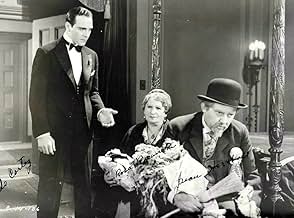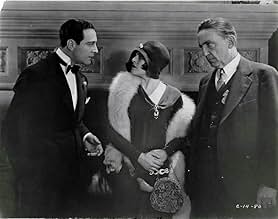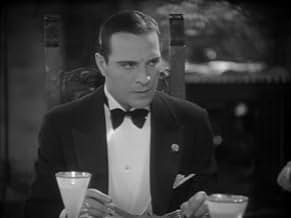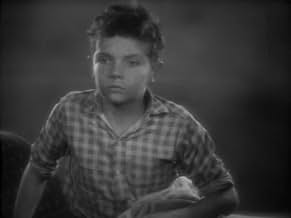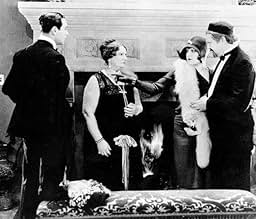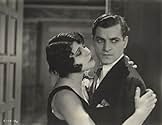IMDb-BEWERTUNG
6,3/10
413
IHRE BEWERTUNG
Füge eine Handlung in deiner Sprache hinzuSoap-opera about a social-climbing Jewish man and his old-world parents who are heartbroken by his rejection of them.Soap-opera about a social-climbing Jewish man and his old-world parents who are heartbroken by his rejection of them.Soap-opera about a social-climbing Jewish man and his old-world parents who are heartbroken by his rejection of them.
- Regie
- Drehbuch
- Hauptbesetzung
Syd Crossley
- Goldfish's Butler
- (as Sid Crossley)
Joe Bordeaux
- Crook
- (Nicht genannt)
Ferike Boros
- Delancey Street Woman
- (Nicht genannt)
Clarence Burton
- Police Desk Sergeant
- (Nicht genannt)
Paul Ellis
- Crook
- (Nicht genannt)
Ruth Feldman
- Market Woman
- (Nicht genannt)
Otto Fries
- Tradesman
- (Nicht genannt)
Julia Swayne Gordon
- Mrs. Striker
- (Nicht genannt)
Donald Hall
- Minor Role
- (Nicht genannt)
Leon Janney
- Eddie Lesser as a Boy
- (Nicht genannt)
Julanne Johnston
- Irma Striker
- (Nicht genannt)
Virginia Marshall
- Birdie Goldfish as a Girl
- (Nicht genannt)
Empfohlene Bewertungen
I just had the opportunity to see this film on our most valuable classic film resource, TCM. It was good to see, purely for historic purposes regarding Frank Capra's career. One good thing about the silent parts is that if you had taped or Tivo'd the film, you can scan the silent scenes at double speed and still follow the story. One curious thing (stemming from the original story) stood out for me though; if I wanted to change my name from Goldfish to a classier name, I would surely change it to Gold instead of Fish! After all, Samuel Goldfish changed his name to Goldwyn. I say, when in doubt, keep the Gold and lose the Fish!
Younger Generation, The (1929)
** 1/2 (out of 4)
Early Capra melodrama has poor Jewish family taken out of the ghetto by their youngest son (Ricardo Cortez) who strikes it big. He moves his father (Jean Hersholt), mother (Rosa Rosanova) and sister (Lina Basquette) into a large house and expects them to do what he says and stay away from the "filth" they grew up around. Soon the three start to realize that money can't buy happiness but will the son learn this before it's too late? At this point in time Columbia was still a very small studio so they couldn't afford to go all in in terms of sound movies so this is another example of a silent with a few sound segments scattered throughout the film. I've always found this to be incredibly distracting but I think Capra does a great job at when to use the sound and I also think the quality of the recorded words is among the best I've heard from this era. Considering how poor the studio was it's rather shocking that some of the other studios early talkies didn't come off sounding better. With that said, there are some major problems with the film but for the most part it's a nice time filler that fans of the director will want to check out. The biggest problem is that even in 1929 this material was way too predictable. There's really not a single thing that happens in the film that you won't see coming from a mile away. The format pretty much follows every morality film that came before it and I just wish at some point Capra would have shaken things up just to keep us off guard or at least in some drama. It should come as no shock that Capra does a great job with what's here and manages to keep the film moving quite fast and he keeps it as entertaining as the screenplay will allow. The cast also keeps things moving nicely with their fine performances. Cortez would play this type of role countless times in his career and he always managed to do good with it. Hersholt clearly steals the film as the tortured father. In the end, this isn't the greatest film ever made but I think Capra did the most he could considering what he had to work with. I think those who like to search out these early talkies will find the quality here to be above average and will make one wonder why some of the bigger studios didn't have their stuff sounding as good.
** 1/2 (out of 4)
Early Capra melodrama has poor Jewish family taken out of the ghetto by their youngest son (Ricardo Cortez) who strikes it big. He moves his father (Jean Hersholt), mother (Rosa Rosanova) and sister (Lina Basquette) into a large house and expects them to do what he says and stay away from the "filth" they grew up around. Soon the three start to realize that money can't buy happiness but will the son learn this before it's too late? At this point in time Columbia was still a very small studio so they couldn't afford to go all in in terms of sound movies so this is another example of a silent with a few sound segments scattered throughout the film. I've always found this to be incredibly distracting but I think Capra does a great job at when to use the sound and I also think the quality of the recorded words is among the best I've heard from this era. Considering how poor the studio was it's rather shocking that some of the other studios early talkies didn't come off sounding better. With that said, there are some major problems with the film but for the most part it's a nice time filler that fans of the director will want to check out. The biggest problem is that even in 1929 this material was way too predictable. There's really not a single thing that happens in the film that you won't see coming from a mile away. The format pretty much follows every morality film that came before it and I just wish at some point Capra would have shaken things up just to keep us off guard or at least in some drama. It should come as no shock that Capra does a great job with what's here and manages to keep the film moving quite fast and he keeps it as entertaining as the screenplay will allow. The cast also keeps things moving nicely with their fine performances. Cortez would play this type of role countless times in his career and he always managed to do good with it. Hersholt clearly steals the film as the tortured father. In the end, this isn't the greatest film ever made but I think Capra did the most he could considering what he had to work with. I think those who like to search out these early talkies will find the quality here to be above average and will make one wonder why some of the bigger studios didn't have their stuff sounding as good.
10mmipyle
Watched "The Younger Generation" (1929) with Jean Hersholt, Lina Basquette, Ricardo Cortez, Rosa Rosanova, Rex Lease, Syd Crossley, and others. Concerning a Jewish family from NYC's lower east side. Directed by Frank Capra, this is silent with three short talkie sequences and a music and sound effects overlay otherwise. Hersholt is content in his surroundings, and loves to joke and laugh and be merry with fellow street hawkers, while his wife, Rosanova, wishes to move up and out of the life they're in. Son Cortez is already hawking newspapers and making money at a very young age, set to rise out of this life and onto Fifth Avenue. His sister, Basquette, is the apple of her father's eye, and she is enamored of a young harmonica player, Lease. He wishes to become a song writer. Cortez and he are at odds from early childhood. As years pass, Cortez becomes ultra successful and moves, taking his family with him, up to Fifth Avenue and tremendous wealth. But the happiness that was seemingly inherent in most of the family is now barred by a steely front of money and vapid social status. Eventually, Cortez actually snubs his family, calling them foolish servants in front of invited wealthy acquaintances so that he won't have to admit that they're his parents. His parents are shattered. The scene is shattering! The final scene, after several circumstances with Lease and Basquette in-between, is also shattering. How Cortez is situated at the end is monumentally shattering.
This moral fable is brilliantly executed by all involved. For me, this was the best performance I've ever seen Cortez give. I was bothered near the beginning with some of Cortez' hand placements which reminded me too much of stage performing and less of film acting. Other than that, the other performances are nothing short of great. The film, though possibly not for everybody, especially if you're turned off by moral fables, is revelatory for the period. It will instantly remind many of "His People" (1925) with Rudolph Schildkraut if any are familiar with that silent; they're nearly the same story, and, curiously enough, Rosa Rosanova is in both films. The film's Jewish circumscription is felt through and through, and Capra has obviously purposely made that choice. The ethnic aura makes the film even more compelling. The prayer that Hersholt prays near the end is supremely moving in context, and the resulting events are the threading of the needle sewing the coming tapestry.
Simply outstanding! The print was also nearly perfect, and the sound was actually well done for 1929. The talkie sequences don't necessarily add anything special to the film, but must have been very satisfying to audiences when the film was released. The sequences don't seem to be like other goat-glanded films of the era, but the sound is used in conjunction with the rest of the film. The final sequence before the very end scene is sound. The end scene itself, which is profoundly silent, is tremendously moving because of its silence. Highly recommended!
This moral fable is brilliantly executed by all involved. For me, this was the best performance I've ever seen Cortez give. I was bothered near the beginning with some of Cortez' hand placements which reminded me too much of stage performing and less of film acting. Other than that, the other performances are nothing short of great. The film, though possibly not for everybody, especially if you're turned off by moral fables, is revelatory for the period. It will instantly remind many of "His People" (1925) with Rudolph Schildkraut if any are familiar with that silent; they're nearly the same story, and, curiously enough, Rosa Rosanova is in both films. The film's Jewish circumscription is felt through and through, and Capra has obviously purposely made that choice. The ethnic aura makes the film even more compelling. The prayer that Hersholt prays near the end is supremely moving in context, and the resulting events are the threading of the needle sewing the coming tapestry.
Simply outstanding! The print was also nearly perfect, and the sound was actually well done for 1929. The talkie sequences don't necessarily add anything special to the film, but must have been very satisfying to audiences when the film was released. The sequences don't seem to be like other goat-glanded films of the era, but the sound is used in conjunction with the rest of the film. The final sequence before the very end scene is sound. The end scene itself, which is profoundly silent, is tremendously moving because of its silence. Highly recommended!
Based on a play by Fannie Hurst, The Younger Generation might be Frank Capra's most personal film up to this point. We've had films that felt like he was just for hire (Submarine and both the Harry Langdon films) and films where he was saying what he wanted to say (pretty much everything else to one degree or another), but this almost feels somewhat autobiographical. Sure, Capra was Italian and not Jewish, but it's about the immigrant experience and the difference between people who came to America as adults and those who were raised on its streets. Well, Capra was raised on those streets and had parents who moved to America as adults (he emigrated from Italy with his family when he was five years old), so this just feels like it should be personal.
The Goldfish family is living on the East Side of New York City while the mother Tilda (Rosa Rosanova) tries to make a living, the father Julius (Jean Hersholt) makes jokes with his friends on the street corner, little Birdie (Lina Basquette as an adult) makes friends with the boy across the way Eddie (Rex Lease as an adult), and the boy Maurice (Ricardo Cortez as an adult) with a real drive for business. When Maruice gets into a fight with Eddie, Maruice accidentally hits the oil lamp above the stove, sending the apartment up in a blaze, but he's not put out by it. He'll make money from their leftover possessions, setting the stage for him to build an import art empire roughly fifteen years later.
The core of the film's story is the implied conflict between the younger and older generations, but it's not quite the simplistic battle of the ages that that implies. Instead, it's a conflict of visions that mostly manifests as the dramatic butting of heads between Maurice and Birdie since the brother is obsessed with status and position in his new life while Birdie has kept up her relationship with Eddie to the point that she wants to marry him.
It's interesting to see the big guy versus little guy dynamic manifest here within a family unit with Maurice becoming the big guy, losing sight of his own humanity, and pushing away everyone else while controlling them with his money, much to the chagrin of everyone else in the family, in particular Julius and Birdie who act like partners in crime. Things turn when Eddie, in a fit of desperation to be good enough for Birdie in Maurice's eyes (I think, this is thin and needs more, to be honest), he helps some local hoods knock off a jewelry story by riding up on the street and singing a song to offer up a distraction. It's a scandal that gets quickly found out, leading to Birdie rededicating her love to him by marrying him and Maurice kicking her out while preventing his parents from knowing that he'd done it.
Now, I should comment on the fact that this is Capra's first sound film. Well, partial sound film. I don't know the background for sure, but it seems like it was at least mostly filmed, The Jazz Singer came out, and they went back to film four scenes with the new sound technology. The transition from silent to sound is the most interesting period in film, in my opinion, and one measure of a director's ability to adapt to changing circumstances. John Ford failed it with The Black Watch while Ernst Lubitsch passed with flying colors in The Love Parade. Capra falls more towards the Lubitsch side, though being only a part talkie there are limits to what one can say on that front. I just want to note that the four scenes are dialogue heavy scenes (similar to Hitchcock's first effort at sound, Blackmail), but he films it like any competent dialogue scene from the later pre-Code period would be filmed, complete with dialogue cutting into shots with people who aren't talking, helping to blend shots confidently. It's surprisingly well done stuff, and it happens to be in a pretty good story to boot. In terms of part-talkies, it recalled the confident way that William Wyler approached it in The Love Trap.
Anyway, the film speeds towards its conclusion after the passage of two years with Eddie in jail, Birdie having his child, and Julius reaches a low point in his health without any contact from his beloved daughter because Maurice is tearing up her letters all leading to the kind of warm-hearted resolution that Capra was known for, though this is tinged with some pointed sadness. It's not entirely happy, Maurice's antagonism towards Birdie gets somewhat resolved but he can't be happy, not even with his money. And that points to what has quickly formed to be Capra's running theme: the little guys prioritize things that the big guys don't, but there are things to be learned across that gap.
It's not a great film, perhaps more interesting for Capra's first foray into sound more than anything else, but it's a solidly entertaining little melodrama that never elevates the material but executes it with some skill.
The Goldfish family is living on the East Side of New York City while the mother Tilda (Rosa Rosanova) tries to make a living, the father Julius (Jean Hersholt) makes jokes with his friends on the street corner, little Birdie (Lina Basquette as an adult) makes friends with the boy across the way Eddie (Rex Lease as an adult), and the boy Maurice (Ricardo Cortez as an adult) with a real drive for business. When Maruice gets into a fight with Eddie, Maruice accidentally hits the oil lamp above the stove, sending the apartment up in a blaze, but he's not put out by it. He'll make money from their leftover possessions, setting the stage for him to build an import art empire roughly fifteen years later.
The core of the film's story is the implied conflict between the younger and older generations, but it's not quite the simplistic battle of the ages that that implies. Instead, it's a conflict of visions that mostly manifests as the dramatic butting of heads between Maurice and Birdie since the brother is obsessed with status and position in his new life while Birdie has kept up her relationship with Eddie to the point that she wants to marry him.
It's interesting to see the big guy versus little guy dynamic manifest here within a family unit with Maurice becoming the big guy, losing sight of his own humanity, and pushing away everyone else while controlling them with his money, much to the chagrin of everyone else in the family, in particular Julius and Birdie who act like partners in crime. Things turn when Eddie, in a fit of desperation to be good enough for Birdie in Maurice's eyes (I think, this is thin and needs more, to be honest), he helps some local hoods knock off a jewelry story by riding up on the street and singing a song to offer up a distraction. It's a scandal that gets quickly found out, leading to Birdie rededicating her love to him by marrying him and Maurice kicking her out while preventing his parents from knowing that he'd done it.
Now, I should comment on the fact that this is Capra's first sound film. Well, partial sound film. I don't know the background for sure, but it seems like it was at least mostly filmed, The Jazz Singer came out, and they went back to film four scenes with the new sound technology. The transition from silent to sound is the most interesting period in film, in my opinion, and one measure of a director's ability to adapt to changing circumstances. John Ford failed it with The Black Watch while Ernst Lubitsch passed with flying colors in The Love Parade. Capra falls more towards the Lubitsch side, though being only a part talkie there are limits to what one can say on that front. I just want to note that the four scenes are dialogue heavy scenes (similar to Hitchcock's first effort at sound, Blackmail), but he films it like any competent dialogue scene from the later pre-Code period would be filmed, complete with dialogue cutting into shots with people who aren't talking, helping to blend shots confidently. It's surprisingly well done stuff, and it happens to be in a pretty good story to boot. In terms of part-talkies, it recalled the confident way that William Wyler approached it in The Love Trap.
Anyway, the film speeds towards its conclusion after the passage of two years with Eddie in jail, Birdie having his child, and Julius reaches a low point in his health without any contact from his beloved daughter because Maurice is tearing up her letters all leading to the kind of warm-hearted resolution that Capra was known for, though this is tinged with some pointed sadness. It's not entirely happy, Maurice's antagonism towards Birdie gets somewhat resolved but he can't be happy, not even with his money. And that points to what has quickly formed to be Capra's running theme: the little guys prioritize things that the big guys don't, but there are things to be learned across that gap.
It's not a great film, perhaps more interesting for Capra's first foray into sound more than anything else, but it's a solidly entertaining little melodrama that never elevates the material but executes it with some skill.
In this film, we see Morris Goldfish (Ricardo Cortez) bring success to his Jewish family, first as a young newspaper boy in New York City, and later a very successful, ambitious businessman. His mother (Rosa Rosanova) sees his skills, and encourages him, but the father and sister miss their old ramshackle home and old friends on the lower east side. This is one of the crossover films, where the soundtrack technology was invented while the film was being made. About halfway through the film, it switches from a silent film with title cards into a talking picture with sound track. Then it goes back to using title cards until the very end, with the final scene using sound again. Most of the cast had been making silent films for years, so they probably had to adjust to the sound portions. Good job by most of the cast. Papa Goldfish (Jean Hersholt) spends most of the film lamenting their new high-society lifestyle, and it gets annoying after a while. He won't even be happy when one of his kids gets engaged and married. We watch as Morris gets more and more successful, and he treats his own family very badly. Most of the story is told in dialogue, and after the big, grand opening, it looks like the rest was filmed in one room. This came out just before the big money crash of 1929, so we can assume that Morris will get what he deserves later, even if this story ends mostly on a sad note.
Wusstest du schon
- WissenswertesFirst part-dialog sound film for Columbia Pictures and director Frank Capra. Both wanted to make an all-talking film, but equipped sound stages were at a premium at the time.
- PatzerWhen Birdie tells Eddie (via intertitle) that his song has been sold for $1000, he excitedly mouths the words "Five thousand?"
- Zitate
Title Card: New York's Lower East Side--a melting pot, where the younger generation struggles to free itself from the old-world ideas of its fathers.
- VerbindungenFeatured in Frank Capra's American Dream (1997)
Top-Auswahl
Melde dich zum Bewerten an und greife auf die Watchlist für personalisierte Empfehlungen zu.
Details
- Laufzeit1 Stunde 15 Minuten
Zu dieser Seite beitragen
Bearbeitung vorschlagen oder fehlenden Inhalt hinzufügen

Oberste Lücke
By what name was Junge Generation (1929) officially released in India in English?
Antwort
